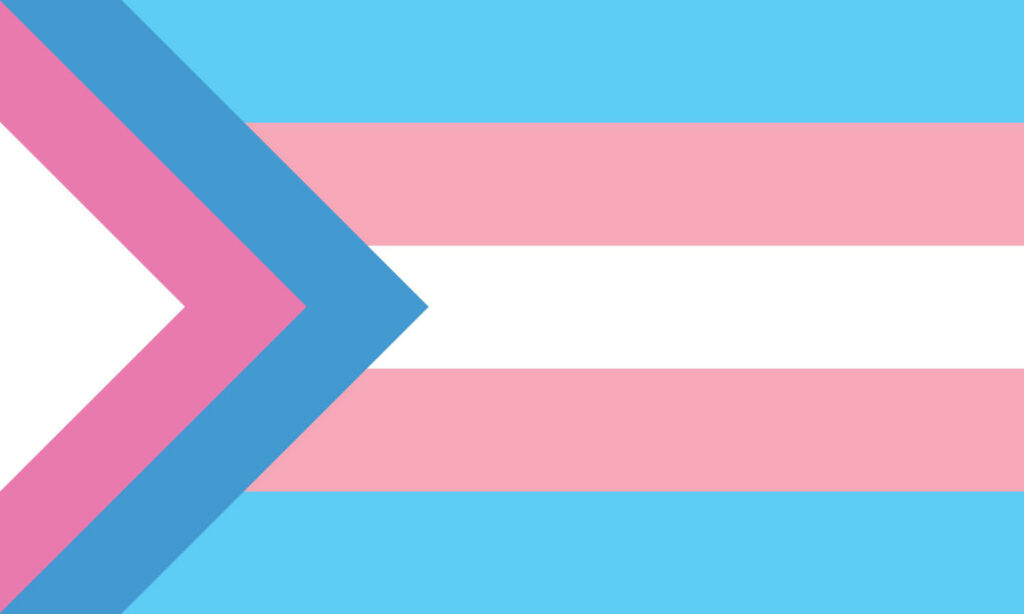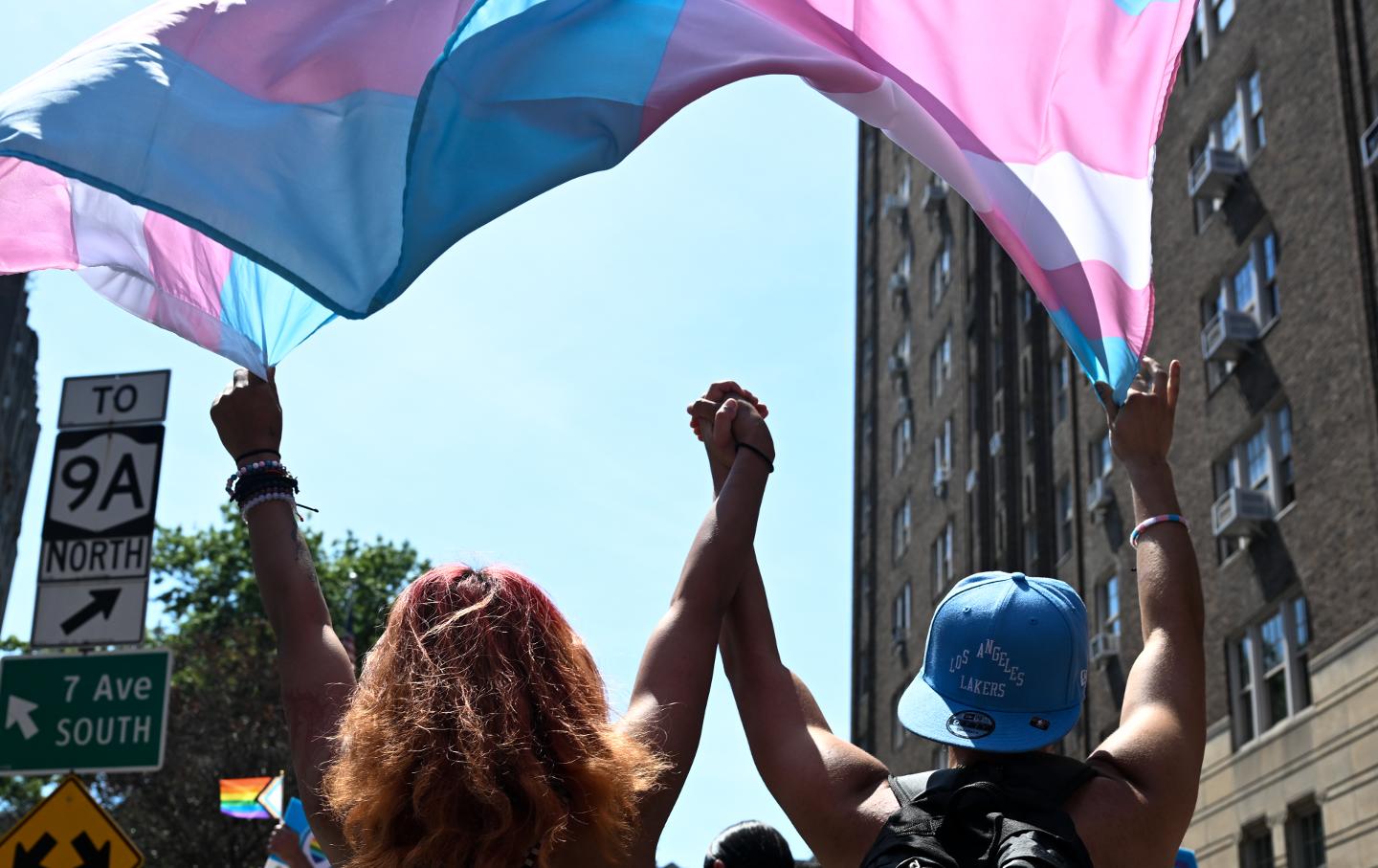“T4T” is a highly significant term within the transgender community. It originally appeared in Craigslist personal ads but has since taken on a broader meaning. T4T represents a symbol of solidarity among transgender people and promotes a culture of acceptance, love, and support within the LGBTQ+ community. Today, we will delve into the meaning, history, and evolution of the term “T4T” and explore the ways in which it has helped trans people nurture a culture of mutual aid.
T4T meaning
The term trans-loving-trans (TLT), also known as trans for trans (T4T or t4t), is often used to describe transgender people who are sexually attracted to, love, and date other trans and non-cis people. Depending on each person, that can mean either primarily or exclusively! The term t4t doesn’t define someone’s sexuality. You can be t4t and be pansexual, straight, gay, lesbian, or any other sexuality.
T4T has evolved into a symbol of solidarity within the trans community. Initially representing romantic and sexual connections, trans for trans now extends beyond mere partnerships to encompass a profound sense of camaraderie among transgender individuals, reflecting shared experiences and identities.
The impact of care, love, and acceptance in the trans-loving-trans community
Robin Gow, a trans and queer poet and educator from rural Pennsylvania, wrote in its deeply moving lyric essay, On Visibility, and/or a T4T Love Poem:
“On the first night we sleep together, you cup my face in your hands and say, “I see you. I really see you,” and I know you’re talking about my gender and I believe you so deeply my body shakes.
I say, “I see you too,” and you cry and I cry and we both hold each other on my too-small twin bed.
You are the first other trans person I date and you have bright purple hair the same purple as mine. We lie on stomachs and invent pronouns and, alone with each other, we feel no shame or fear at all in letting ourselves explore what language could reify us.
What if I told you I only feel truly visible with other trans people?”
Far more than a shorthand for dating preferences, t4t embodies fundamental values of care, love, and acceptance that unite the community in the face of societal challenges. Prioritizing safety concerns and embracing diverse relationships, t4t fosters a nurturing environment grounded in mutual respect and understanding.
From its humble beginnings on Craigslist to its current status as a cornerstone of trans-centric politics, t4t epitomizes the community’s unity and resilience. Understanding the significance of belonging to this network is crucial for those who identify as t4t and allies seeking to support their loved ones in navigating their identities.
“What if I told you I only feel truly visible with other trans people?” — Robin Gow
A statement against devaluation

Source: The Nation
The concept of t4t goes beyond labeling and serves as a powerful stance against the mistreatment of transgender individuals in society. T4T has become synonymous with mutual aid, platonic love, community support, and broader solidarity within the trans community. It signifies a declaration of solidarity among community members, conveying the message that “We stand together in a world often devoid of understanding.”
The T4T meaning also has significant political significance, as it primarily involves engaging with fellow trans individuals in romantic, sexual, or platonic relationships, asserting their worth and that of their peers, and defying external devaluation. This ethos of “trans community care” extends beyond individual connections, as it encompasses a collective commitment to supporting and uplifting one another through shared experiences and challenges.
In the context of t4t, mutual aid becomes a cornerstone of everyday practice. It involves the reciprocal exchange of resources, emotional support, and practical assistance within these networks. Whether offering a listening ear during times of distress, providing access to healthcare resources, or advocating for one another’s rights, mutual aid fosters a sense of empowerment and resilience within the community.
This solidarity holds profound political weight, challenging mainstream narratives concerning who deserves love and acceptance. Through acts of self-love and communal care, t4t underscores the worthiness of every member while advocating for broader societal change. It’s not just about finding love or companionship; it’s about building a community where everyone is valued, supported, and celebrated for who they are.
Empowering transgender communities: The political and social impact of T4T relationships
Navigating the world as a transgender person comes with its unique set of challenges, ranging from societal discrimination to institutional barriers. Transgender people often face heightened rates of violence, discrimination in employment and housing, and inadequate access to healthcare. In such a landscape, finding understanding and support can be difficult.
The t4t community places great importance on support and solidarity among its members. By sharing their experiences and providing mutual aid, community members offer emotional support, resources, and practical assistance to help each other navigate the challenges they face.
For instance, in recent years, terms like “chaser” have negatively referred to cis men pursuing transgender women, highlighting why many TLT individuals prefer relationships with other trans people—because it often feels safer and more understood.
To help create a sense of belonging and visibility within the community, HER offers in-app pride pins that allow individuals to express their identity and preferences. We also have free features that allow members to filter their feeds based on their preferences, which helps to ensure a safe and supportive environment for everyone in the community.
Beyond individual support, t4t carries significant political and social implications. As a movement rooted in the empowerment and visibility of trans people, t4t challenges mainstream narratives and promotes inclusivity and acceptance. By prioritizing relationships with fellow trans individuals, t4t asserts the worth and dignity of transgender people, countering societal marginalization and discrimination.
It’s beyond to important to recognize that T4T is crucial in the broader progressive movement and identity politics. By centering the experiences and voices of transgender individuals, t4t advocates for systemic change and social justice. It highlights the intersections of gender identity, sexuality, and other marginalized identities, fostering solidarity across diverse communities.
In Killjoy Feminism, Sara Ahmed wrote, “Solidarity does not assume that our struggles are the same struggles, or that our pain is the same pain, or that our hope is for the same future. Solidarity involves commitment, and work, as well as the recognition that even if we do not have the same feelings, or the same lives, or the same bodies, we do live on common ground.”
The true T4T meaning represents more than just a dating preference; it embodies a commitment to building a more inclusive and equitable society for all. As we continue to celebrate and support the t4t community, we contribute to a world where everyone can thrive authentically and without fear of discrimination.
Supporting your t4t loved ones
Supporting a loved one who identifies as t4t requires empathy, education, and a commitment to understanding their unique experiences. Navigating this journey with compassion, love, and respect can make such a massive difference in someone’s life!
So, we thought we’d go ahead and give you a few suggestions on the best places to start:
- Educate Yourself: Take the time to learn about the experiences and challenges faced by transgender kids, teens, and adults! Books, articles, and online resources can provide valuable insight into the transgender community and its diverse identities. We recommend reading Killjoy Feminism by Sara Ahmed, Who’s Afraid of Gender? by Judith Butler, and Dear Senthuran by Akwaeke Emezi.
- Open Communication: Start an honest and open dialogue with your loved one regarding their identity, experiences, and preferences. Listen attentively without being judgmental and acknowledge their feelings and concerns. Creating a supportive and understanding environment is crucial for establishing trust and building a healthy relationship.
- Respect Boundaries: It’s important to respect your loved one’s boundaries and autonomy. Avoid making assumptions or pressuring them to disclose information they’re uncomfortable sharing. Respect their decisions regarding their relationships and identities, and offer support without imposing your expectations.
- Advocate for Inclusivity: Advocate for inclusivity and acceptance within your social circles and communities. This involves taking a proactive approach to challenge harmful stereotypes and discrimination against transgender individuals. One effective way to do this is by promoting policies and practices that support transgender individuals’ rights and well-being. It is also essential to educate yourself and others about the unique challenges faced by transgender individuals, such as lack of access to healthcare, housing discrimination, and employment barriers. By doing so, you can actively create a more inclusive and supportive environment for transgender individuals.
By taking these steps and prioritizing empathy and understanding, you can offer meaningful support to your loved one who identifies as TLT. Remember that each person’s journey is unique, and your role is to provide unwavering love, acceptance, and support.
Firstly, getting pronouns right matters. For many in the trans community, being correctly gendered can be affirming and vital for their well-being. If you’re unsure what pronouns your loved one uses, ask them and make a genuine effort to remember them. Just this simple gesture can profoundly demonstrate your allyship.
Beyond just knowing the correct pronouns, using them consistently—even when your loved one isn’t around—sets an example for others and helps create a more inclusive environment.
Last but not least, if you slip up? Apologize briefly without making it about yourself, then move on. It shows that you’re trying without placing unnecessary attention on the mistake.
Source: Prism
Navigating through life, the trans community encounters distinct hurdles that stem from deep-seated systemic bias and a widespread absence of empathy. Navigating through life, the trans community frequently encounters obstacles blocking their access to vital needs such as medical care, secure living environments, and job prospects.
One significant challenge and current issue faced by trans communities is discrimination in healthcare settings. Transgender individuals often encounter barriers to accessing affirming and competent healthcare, including hormone therapy and gender-affirming surgeries. According to a report by the National Center for Transgender Equality (NCTE), 33% of transgender individuals who visited a healthcare provider in the past year reported having at least one negative experience related to being transgender, such as being refused treatment or verbally harassed.
In addition to external challenges, transgender people, especially trans women, often grapple with internalized transphobia and societal stigma, which can impact their mental health and well-being. Research published in the American Journal of Public Health suggests that transgender individuals are more likely to experience depression, anxiety, and suicidal ideation compared to cisgender individuals, highlighting the urgent need for supportive and affirming environments.
Navigating these challenges while seeking authentic connections and relationships within the t4t community can be daunting. However, by acknowledging and addressing these systemic issues, we can work towards creating a more inclusive and supportive society for all transgender individuals. Through education, advocacy, and allyship, we can help dismantle barriers and create safer spaces where members of the trans community can thrive authentically.
The role of mutual aid
Mutual aid projects emerge as lifelines within this landscape. They’re not just about pooling resources; they embody a profound form of community care that’s both practical and revolutionary. Through these initiatives, support networks and trans caregivers offer more than assistance—they provide spaces where respect, dignity, and genuine solidarity flourish.
Navigating the journey from securing healthcare to satisfying basic necessities, mutual aid illuminates the strength of communal experiences and united efforts. It’s an expansive space where trans folks can find not only material help but also emotional support amidst a society that often marginalizes them.
This approach has proven vital for many friends facing eviction or those who simply need someone to lean on during tough times. By focusing on grassroots efforts rather than relying solely on institutional solutions, mutual aid projects foster an environment where everyone is seen as inherently valuable regardless of gender identity.
Understanding t4t meaning is just the start. It’s about seeing beyond labels, recognizing a community’s heart. Embarking on this t4t exploration unveils a profound affection and support, surpassing mere superficial bonds.
Dive deeper; it’s more than words on a page. It’s solidarity in action, mutual aid as our stage. Remember how t4t challenges devaluation with pride? That fight continues daily, with the trans community side by side.
To support means to listen, learn their truth and stand strong. For those identifying as TLT, this is where they belong. Take these insights, carry them forward in your stride.
t4t isn’t just a term; it’s a lifeline for some inside. Let’s not forget the importance of creating safe spaces – ones filled with understanding faces.







